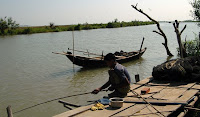Nasaka loots goods from market in Maungdaw
Maungdaw, Arakan State (Kaladan Press): Burma’s border security force, Nasaka, has been looting goods from Amina Bazaar (market) of Maungdaw Township, on every market day (on Tuesdays and Saturdays) from the Rohingya community.
The market is held twice a week, on Tuesdays and Saturdays. So, villagers go to the market to sell their goods and to buy things they need for their families.
However, some Nasaka officials accompanied by Natala villagers of Aung Mangala village, went to the market and collected all kinds of vegetables, onions, garlic, oil, fish, meat, betel leaves and betel nuts, peas, and other things from the Bazaar.
The Nasaka personnel are from Aung Mangala Nasaka out post, which is under the Nasaka Headquarters. Regarding the matter, no action will be taken, if the villagers complain to the concerned authorities. So, the Nasaka loots goods from the market regularly on market days.
After collecting the goods, the Nasaka divides it and gives some of it to Natala villagers and the rest are usually taken by Nasaka personnel. If the stolen goods are in excess, they sell it to the villagers again.
The local people are unwilling to pay for goods to the Nasaka and Natala villagers, but the Nasaka officials force the villagers to pay for these goods.
Villagers often have to become sources for the Nasaka, police and the army in order to earn their living, a village elder said, on condition of anonymity.













